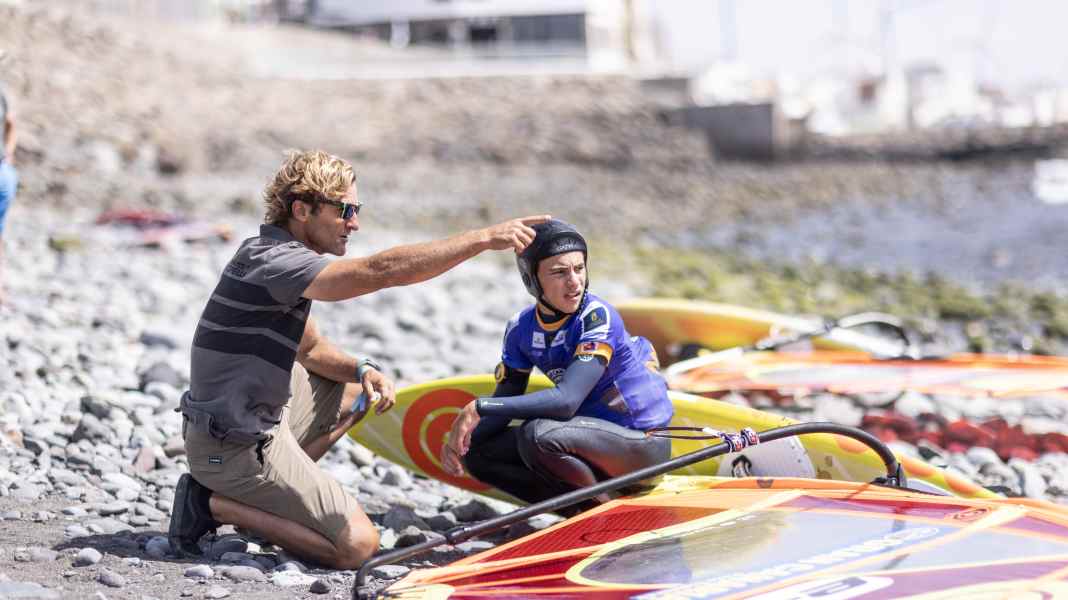Survey: Unsolicited advice at the spot - what the surf community thinks
Julienne Lippertz
· 12.05.2025

- Sometimes tips are well received, sometimes less so
- When a willingness to help tips over - situations that our readers found unpleasant
- What is often overlooked by the "tipsters":
- How tips are better received - recommendations from the community
- Constructive and respectful feedback
- Conclusion: A little more sensitivity at the spot
Our online survey of active windsurfers asked them about their experiences with unsolicited advice. The starting point was an email from a reader who often felt uncomfortable at her spot because she received a lot of unsolicited advice and felt that this was intrusive. Other windsurfers have had similar experiences. Comments often heard included: "The board is too small", "You need a bigger sail", "It needs to be tensioned another 5 mm". These statements raise many questions: Is the tip really helpful? How does the recipient feel about it? And how could you provide more constructive support?
Many water sports enthusiasts report that they receive tips in situations where they didn't want or need help. The statements are often made in moments of concentration or uncertainty - for example, when getting into the water, setting up a sail or trying out a new setup for the first time.
Sometimes tips are well received, sometimes less so
Around 90% of respondents stated that they were regularly confronted with unsolicited advice at the spot. Around half of them find this advice at least partly unpleasant. Overall, opinions on unsolicited advice varied greatly: While some participants perceive such advice as annoying or intrusive, others have no problem with it at all.
As a woman, I've received loads of unsolicited advice from men! Some even from complete beginners, which is really annoying. And unfortunately also "tips" on material, sail size, setting the ropes etc., which didn't take into account my height, weight, waist harness or anything else... it got really bad when they were asked to help.
The majority of respondents (around 70%) are in the middle of the spectrum and emphasise that the effect of such advice depends heavily on the situation in question. Overall, however, a rather negative trend emerges: around 40% of participants state that they often find unsolicited advice rather unpleasant.
It can be annoying. But it can also help. Especially when trimming, tips for occasional surfers can help. There is no standardised rating.
When a willingness to help tips over - situations that our readers found unpleasant
"You have to do it differently!"
A frequent trigger for discomfort was the tone in which advice was given. Statements such as "You 'MUST' do it this way" often came without context, regardless of the material available or the person's ability.
Unsolicited intervention on the material
One reader described how someone simply pulled on his sail and tightened it - without asking. He was actually ready to set off. Although he would generally find it helpful if someone helped him trim his sail, simply asking would have turned an unpleasant situation into welcome support.
Unsolicited criticism - despite years of experience
A windsurfer who has been on the water for 40 years was told by someone just before she went into the water that her equipment was supposedly unsuitable. A comment like this, even before you get active yourself, can unsettle or simply annoy even experienced athletes.
Disregard for older equipment
Several readers reported how their equipment was ridiculed. Sentences such as "You can't surf properly with that old stuff" were used to disparage them. Ironically, it was often those with the older equipment who were then confidently out on the water - while others with high-tech equipment did little more than ride straight ahead. After all, good equipment is no substitute for experience.
Too much of a good thing: Advice overload for beginners
One wingsurfing beginner described how he received new tips every few minutes - although he simply wanted time to try things out. The many pieces of advice caused confusion rather than progress.
When help is not forthcoming even though it is needed
And sometimes it's not the unsolicited advice that hurts, but the lack of support: one reader reports that she was simply observed - and ridiculed - in a difficult situation. No helping hand, no genuine interest - just a spectator.
What is often overlooked by the "tipsters":
- You usually don't know the situation completely. If you give tips without knowing the person or their material, you risk making false assumptions
- Overconfidence is widespread. Many people believe that their own experience is universally valid and overlook the fact that windsurfing is a very individual sport
- The wording makes all the difference. A comment like "The sail is too small" can quickly come across as patronising - especially if it is patronising or arrogant in tone.
How tips are better received - recommendations from the community
The surf survey also shows that it is not a question of advice being unwelcome in principle. Rather, the majority of participants would like to see a respectful and sensitive approach. Many of our readers also write about pleasant situations in which they received help:
The classic on Maui - Dave Ezzy sees one of his sails on the beach in Kanaha, trims it briefly and says two sentences about it. It's great that he takes the time and you can't get more competent than that. Be more like Dave.
Some suggestions from the community:
- First ask, then help. For example: "Do you need support right now or should I give you a tip?"
- Label your own opinion as such. Statements such as "I have had good experiences with a larger sail, maybe that will help you too?" are more likely to be accepted than absolute statements.
- Act according to the situation. If you see that someone is obviously struggling or unsure, you can offer help - but without pressure.
- Self-reflection is important. Questions such as "Why am I giving this tip right now?" or "How would I feel if someone said this to me?" help to scrutinise your own motivation.
Constructive and respectful feedback
The main focus of our readers is that advice is welcome as long as it is constructive and respectful. Sharing ideas in a community is important and can also be very helpful. The important thing here is simply the right level of communication - then it can really take one or two people a big step further.
I don't think it's usually a problem to give tips if they are constructive. Surfing is quite complex, and most of it you kind of teach yourself and maybe not everything is always clear to you; rigs, weather, surf spots... so you're actually happy when you get tips or exchange experiences.
Support can be really important, especially if, as in this situation, you are helping the younger generation to find and keep the fun in sport. Always remember that fun and enjoyment should take centre stage.
I really benefited from it once when I was young. It was a holiday on Fuerte. I had brand new sails, trimmed completely wrong. I really struggled with it on the water. Then an older gentleman came along and showed me how to trim the sail correctly/at least better. I then went out on the water with him...and lo and behold: the struggle was over!
Conclusion: A little more sensitivity at the spot
Most windsurfers want an atmosphere of mutual respect at the spot. This also includes giving unsolicited advice with caution - or sometimes keeping it to yourself. Because what is intended as help can easily be taken as criticism.

